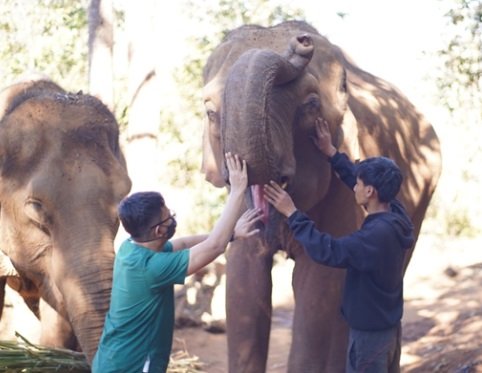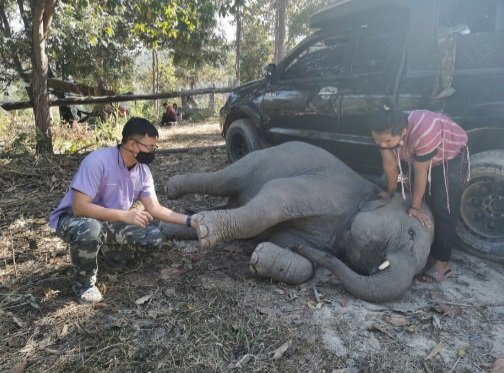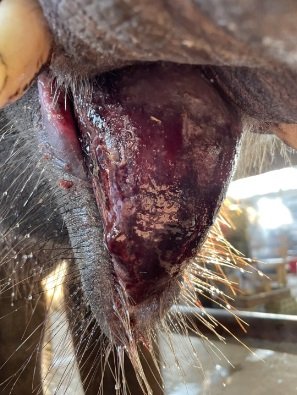Dry, dusty conditions lead to eye irritations in elephants
Our partners with the Chiang Mai University’s Mobile Vet Clinic had a busy start to the New Year. On January 7, Dr. Siripat and his team traveled to visit an elephant in the Mae Wang area who was reported to have an eye issue. When the vet team arrived, they found the elephant playing in a field filled with dried corn husks, which they determined to be the cause of the tearing eye. The veterinary team provided treatment and medication to the elephant and the owner was also provided instructions for future care.
January 10 saw Dr. Siripat and the Mobile Vet Clinic headed to the Mae Chaem area to visit an elephant who was suffering from gastrointestinal issues and not eating. When the owner called, he said that the elephant wasn’t able to swallow properly and was drooling. The only things the elephant could consume were soft bananas and water. Upon further investigation and after taking a history of the elephant from the owner, they determined that the elephant had eaten leaves from a Red Zebrawood tree which caused irritation in the elephant’s mouth and throat. The male elephant was treated with an antihistamine and inflammation medication. They also were able to educate the owner about food management and urged the them to try to prevent this from happening again in the future.
The next day, the Mobile Vet Clinic made its way back to the Mae Wang area to treat an elephant with colic and another with a foot issue.
The young elephant with the foot issue was observed with an awkward walking style. After the use of thermal camera imaging, the vet team determined that the elephant had thinning foot pads causing the pain when walking over rocky terrain.
Dr. Siripat exams the foot of this young elephant
The young elephant had been playing on a sandy ground-cover, which may have caused the thinning of the foot pads. The doctor suggested ways to solve the problem and the owner will monitor the symptoms.
With the help of the Thai Elephant Alliance Association (TEAA), the elephant with colic was treated with supplements, pain and gas relievers. An enema was also performed and it was discovered that there were dry, rough feces inside which may have contributed to the issue. While treating this elephant, another elephant required treatment for gastrointestinal issues as well. The team spent the night with these elephants and both were looking better the next day as the feces began to move out.
On January 20, the team traveled to Chiang Mai to begin treatment for a 2-year-old elephant who was showing signs of EEHV - purple tongue, lethargy, swollen face and fever. Again with help from the TEAA veterinary team, the young elephant was immediately given antiviral medication, anti-inflammatories, steroids and fluids. Blood was collected from the adult elephant herd members in order to perform a blood transfusion for the calf. Thankfully, with the timely and skilled treatment from the CMU Mobile Vet Clinic and the TEAA, they were able to save the young elephant's life.
Stay tuned next month for Dr. Siripat’s February update on the activities of the Mobile Vet Clinic. Please show your support for the Chiang Mai University veterinary team, by visiting www.asianelephantsupport.org to make your donation.




